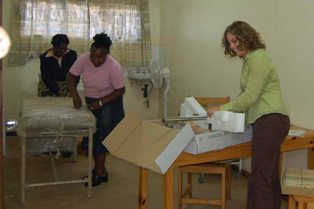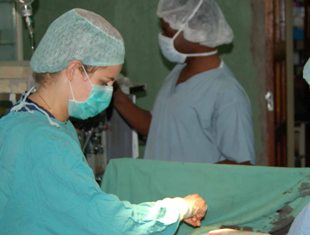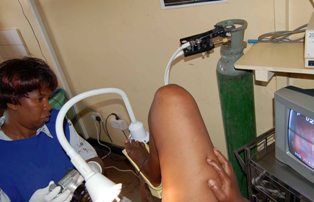
 |
| News & Outreach |
|
||||||
Global Health MattersMarch - April, 2008 | Volume 7, Issue 2
Fogarty Trains Future Generation of Global Health InnovatorsFogarty staff were energized by the enthusiasm of the returning Fogarty Scholars, who visited the NIH campus en masse recently to share notes from their research experiences abroad. The topics of the lectures and displays were wide-ranging and included research areas such as HIV status disclosure in Russia, neurodevelopmental delay in HIV-infected children in South Africa, and cervical cancer research in Zambia. "It's thrilling to see the level of talent in our scholars, and the amazing growth of this initiative," Fogarty Director Dr. Roger I. Glass. Fogarty's International Clinical Research Scholars Program, jointly administered by Fogarty and Vanderbilt University's Institute for Global Health, offers a year of mentored clinical research training at sites in the developing world, in hopes the recipients will ultimately seek careers in global health-related clinical research. A key element of the program is a stipend provided for a foreign graduate student to work alongside the U.S. trainee. Research training sites include Botswana, Haiti, India, Kenya, Mali, Peru, South Africa, Thailand, Uganda, Bangladesh, China, Russia, Tanzania, Zambia and the recent addition of a site in Fortaleza, Brazil. Ms. Krista Pfaendler, a third-year medical student from the University of Pittsburgh, spent a year in Zambia helping to build a cervical cancer screening and treatment program. Cervical cancer is the deadliest form of cancer among African women. Those infected with HIV/AIDS are five times more likely to develop the disease. Since women account for more than half of those living with AIDS in Zambia, the problem is enormous.  New equipment was required to open the 14 cervical cancer screening sites established in Zambia. Pfaendler and her colleagues at the Centre for Infectious Disease Research in Zambia (CIRDZ) implemented a number of innovative practices, including the use of consumer-grade digital cameras for cervical photography and a low-cost method of visual inspection using acetic acid, which is essentially household vinegar. "It was important that we integrated these practices into the public health system that already existed in Zambia, rather than reinventing everything," she said. During her 10-month stint, 15 nurses were trained and more than 8,000 cervical exams were conducted. Of the nearly 1,500 women referred for further testing, about 150 were diagnosed with cancer. So far, 14 screening sites have been established in the country. The eventual goal is to replicate the idea for adoption elsewhere in Africa. For Pfaendler, the experience has changed her life and the focus of her career, she says. "Human interaction has always been important to me, but working with these patients lit a fire in me," she said. Jason Goldman, a third-year student from University of Pennsylvania School of Medicine, also conducted research in Zambia. His work focused on optimizing the timing of antiretroviral therapy initiation in resource-poor settings, and on simple adherence to predict virologic suppression among HIV-infected adults. Since little data existed on these topics in Zambia, Goldman's project and others like it are now helping to reshape public health policy there. "The experience changed my view of the world, how I regard research, even how I use data," said Goldman. "Most of all, it made me aware of problems I didn't even know existed." Fourth-year student Ms. Christina Tara Khan was similarly transformed by the scholars program while working in Peru. "It has really solidified my vision for the future," she said. "It also introduced me to the realm of surgical research." A medical student at University of Illinois, Ms. Khan designed a novel study on outcomes in patients treated for invasive cervical cancer at Peru's main cancer treatment center. As a result of her experiences, she has since developed a real love of surgery and surgical research, which she intends to combine with a long-standing interest in public health.  About 150 Zambian women were diagnosed with cervical cancer and referred for surgery. "There is more energy than ever in the global health field" said Dr. Sten Vermund, the Principal Investigator of the program and Director of the Vanderbilt University Institute for Global Health. "This group is proof of that." In addition to Fogarty, the NIH centers who fund and support the scholars program are the National Institute of Allergy and Infectious Diseases, the National Center on Minority Health and Health Disparities, the National Cancer Institute, the National Institute on Drug Abuse, and the National Institute of Child Health and Human Development. Program support for the solicitation and review of applications is provided by the Association of American Medical Colleges, in collaboration with the Association of Schools of Public Health.  Cervical screening is conducted using a consumer-grade digital camera. (All photos courtesy of K. Pfaendler) The three-day session also served as the interview and selection process for the newest candidates, a group of 40 that had been narrowed down from 157 applicants. "Our hope is to attract candidates at the earliest point in their careers possible," said Fogarty program officer Dr. Aron Primack. "We aim to give them both an alternative to private practice and a unique life experience." To learn more about Fogarty's International Clinical Research Scholars Program visit: http://www.fic.nih.gov/programs/training_grants_nih_fogarty.htm Should you require Adobe Acrobat for viewing PDFs, current and free accessible plug-ins are available at the Adobe website.
|
|||||||
|